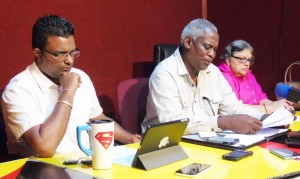PPP elections commissioner plans to block house-to-house registration

PPP GECOM Commissioners: (left to right) Sase Gunraj, Robeson Benn and Bibi Safora Shadick
Opposition-nominated elections commissioner, Robeson Benn has threatened to take Chief Elections Officer Keith Lowenfield to court to block the Guyana Elections Commission (GECOM) from conducting house-to-house registration.
Through his Attorney-at-law, Anil Nandlall, Benn said house-to-house registration would introduce residency status in Guyana as a new condition to be registered and that would result in thousands of overseas-based Guyanese being unable to vote.
“In the circumstances, I respectfully demand that you refrain from embarking on, or proceeding with, this unlawful and unconstitutional exercise, which will disenfranchise thousands of persons now qualified to vote.
If I do not hear from you within seven days of the date hereof, I will assume that you have rejected my demand and I will have no alternative but to advise my client to institute legal proceedings against you, to restrain you from embarking on, or proceeding with, the aforesaid house-to-house registration,” Nandlall told Lowenfield.
The letter was copied to Chairman of the Guyana Elections Commission, Retired Justice James Patterson.
Nandlall, on behalf of elections commissioner Benn, contended that house-to-house registration would unconstitutionally bar Guyanese overseas from voting.
“The ultimate consequence of this decision of GECOM is that GECOM is, indirectly, adding a new qualifying requirement to vote, which is not provided for by the Constitution, and which is ultra vires the Constitution: that requirement is “residency within Guyana,” Nandlall said.
The three governing coalition commissioners and the GECOM Chairman reportedly voted in favour of house-to-house registration before General elections are held some time in November, 2019.

Pro-coalition elections commissioners Desmond Trotman, Charles Corbin and Vincent Alexander.
Nandlall contended that house-to-house registration would be fraught with hazards, including, the violation of the Constitution and the constitutional rights of qualified electors to vote and creating the potential for a subsequent vitiation of the entire elections.
He noted that Article 59 of Guyana’s Constitution states that “Subject to the provisions of Article 159, every person may vote at an election if he or she is of age eighteen years or upwards and is either a citizen of Guyana or a Commonwealth citizen domiciled and resident in Guyana.”
Article 159 provides that no one shall vote at an election unless he is registered as an elector and a person shall be qualified to be so registered, if on the qualifying day, that person is eighteen years and over and a citizen of Guyana or, a Commonwealth citizen, who is domiciled and resident in Guyana for a period of one year immediately preceding the qualifying date.”


